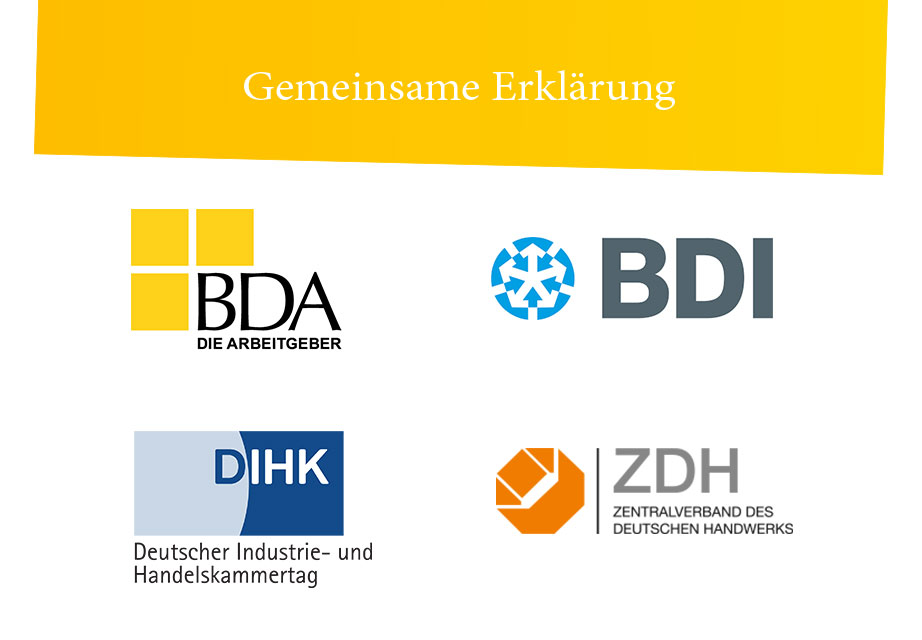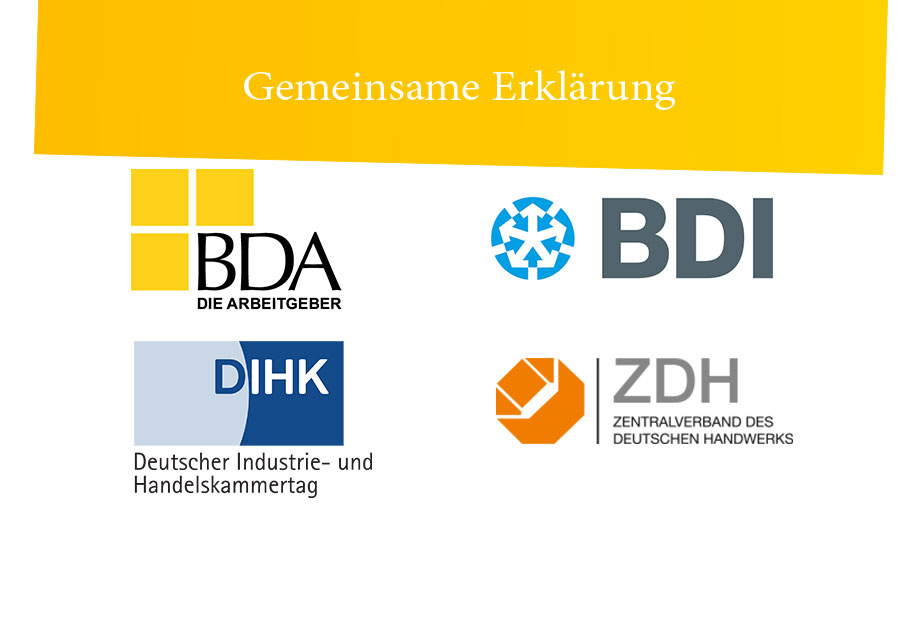- TOPICS
-
-
- Employment and Labour Market
- Labour law and collective bargaining policy
- General applicability
- Industrial action
- Labour & collective bargaining law
- Working time
- Time limit
- Works Constitution
- Bureaucracy reduction
- Data protection
- Protection against discrimination
- Parental leave
- Posting
- Insolvency
- Protection against dismissal
- Minimum wage
- Co-determination
- Mobile work
- Maternity protection
- Pandemic
- Care time
- Self-employment
- Tariff autonomy
- Collective Bargaining Agreement
- Collective bargaining unit
- Tariff policy
- Collective bargaining
- Collective agreement
- Part-time work
- Restructuring
- Holiday law
- Contracts for work
- Whistleblowing
- Temporary work
- Education and vocational training
- Training market
- Professional orientation
- Education policy
- Education 4.0
- Dual education
- dual study
- Permeability
- Early childhood education
- Higher Education Funding
- Lifelong learning
- Teacher Education
- Reorganization of education and training
- STEM Professionals
- Economic education
- Accreditation/Quality assurance
- SCHOOLBUSINESS Germany
- Digitalization and innovation
- Europe and International Affairs
- Social policy and social security
- Old-age poverty
- Work made in Germany
- Occupational safety
- Contribution and registration law
- Company pension scheme
- Shortage of company doctors
- Health insurance
- Long-term care insurance
- Mental health
- Pension insurance
- Riester pension
- Social self-government
- Social insurance
- Accident insurance
- The future of social security
- Taxes & Finances
- Economy & Society
-
-
-
- Newsroom
- The BDA
- Members

For a new beginning that will make our country strong in the long term

The four leading associations of the German economy, BDA, BDI, DIHK and ZDH, present a joint declaration "For a new beginning that will make our country strong in the long term". In it, they call on the future German government to develop an Agenda 2030 to increase the competitiveness of locations, companies and jobs.
Berlin, 9 November 2021 - Companies and businesses in Germany and their employees are facing major challenges: Demographics, digitalisation, decarbonisation and trends towards de-globalisation are leading to what is probably the most profound structural change in the German economy since reunification. Added to this are distortions in world trade and geopolitical repositioning, which mean a high degree of uncertainty for our country's export-oriented economy.
In this situation, we expect clarity and determination from the new Federal Government. We take the announcement of new beginnings seriously. A new beginning does not mean more regulation and burdens. A new beginning means economic dynamism with confidence in the creativity of people in local businesses. And new beginnings can only be achieved with respect for property, entrepreneurial performance, entrepreneurial spirit, independence, risk-taking and responsibility for jobs.
A coalition for the future of Germany must also aim to create a business location with a future. Only with companies that responsibly use their freedom as innovators, investors and employers will we successfully shape the future of our country. To do this, they need good framework conditions such as an efficient infrastructure, a reliable and cost-effective energy supply and a good education system. We therefore expect clear signals in this direction in the coalition agreement.
Our expectations:
We need to give way to greater competitiveness. In many fields, German policy lags behind the world's best. Administering past successes is not enough. An Agenda 2030 that increases the competitiveness of locations, companies and jobs at national and international level must be the benchmark for policy. This includes a competitive tax system that also realises possible relief.
We are committed to ambitious climate targets and call for openness to market-based climate protection. Our companies want to be at the forefront of an economy that is sustainable in every respect. In doing so, we rely on innovation and the market economy instead of bureaucracy and prohibitions. Climate protection is the global challenge of the coming decades. We should therefore not primarily argue about the goals, but rather focus together on the "how". In almost all sectors, we need to reduce the climate impact to a minimum within tight timeframes. This requires nothing less than a complete, and at the same time technology-open, conversion of energy supply and mobility on the basis of renewable energies. It also requires a far-reaching conversion of production processes that are still emission-intensive today and the development of sustainable and recyclable products and services. The huge investments and increased operating costs required for this can only be met by companies and businesses if German and European policy-makers achieve a fair competitive situation through international climate protection agreements. In order to achieve the global climate targets, we must drastically reduceCO2 emissions not only in Germany and Europe. We are convinced that it is at least as important to support our customers and thus people worldwide with innovative products, new industrial processes and services to be able to combine climate protection and the pursuit of greater prosperity.
We can only achieve sustainable growth with more investment, especially from the private sector. Together, we must say goodbye to a complicated and bureaucratic Germany. Instead, the guiding principle for the future Federal Government should be to enable private investment by giving more freedom to entrepreneurial decisions, faster planning and approval procedures and an investment-friendly tax policy.
Sound finances make an important contribution to this. For entrepreneurs, sustainable and transparent state financing is also important evidence of the credibility of politics. After all, they know that high debts today are the tax burdens of tomorrow. Companies in Germany want to invest - in new, digital and sustainable business models, processes, products and services. But they need the means to do so. If they are denied this leeway through higher social security contributions or taxes, we will not successfully manage structural change.
We are committed to an enabling welfare state. It is not social who spends the most money. Strengthening personal responsibility and empowering people - this is what social policy must do. Only with such an understanding will we succeed in keeping the upper limit of social security contributions at 40 percent. Without reforms, social security contributions could rise to 50 percent by 2040. We expect a renunciation of spending programmes that cannot be financed and rather the realism that our social security systems can only be made fit for the future in response to demographic change by means of reforms - such as making the age limit more flexible. Sustainability as a political leitmotif must also include the social security systems.
We need a clear yes to a modern working world shaped by structural change trends. People today have different ideas about the compatibility of private and professional life than they did 20 years ago. Digital technologies make it possible to work more independently of location. The rules of the working world must therefore be developed further with a view to the new realities. Responsible and flexible working hours must be just as possible without bureaucracy as flexible, mobile and autonomous forms of work. This also includes respect for company agreements and social partnership arrangements. We expect a new federal government to make a strong commitment to social partnership and collective bargaining autonomy. Interference in the work of the independent minimum wage commission and a politically forced expansion of the declaration of general applicability of collective agreements are the opposite of this.
We should join forces to launch a comprehensive education, training and further training offensive. The major political goals - especially in climate protection and digitisation - can only be implemented with qualified employees in our companies. At the same time, Germany must become more attractive for foreign skilled workers. The new Federal Government must simplify and accelerate the procedures for targeted and qualified skilled labour immigration and abolish bureaucratic hurdles.
We expect a clear commitment to free trade and European integration. Nationalism is the enemy of Germany's cosmopolitan companies. We expect an offensive for the deepening of the internal market, a conclusion of the necessary free trade agreements and a constructive contribution from German politics for a stronger Europe that is closer to its citizens.
A strong economy has never been more important than now: The debts of the Corona crisis must be paid off, the social security systems must be financed sustainably and our country must be prepared to cope with new crises. To achieve this, we need to create new jobs in the structural transformation, to support investments and to implement sustainability more consistently through innovations. As a business community, we want to provide essential answers to the challenges facing Germany in the coming years. To do this, we need the tailwind of a good policy.






